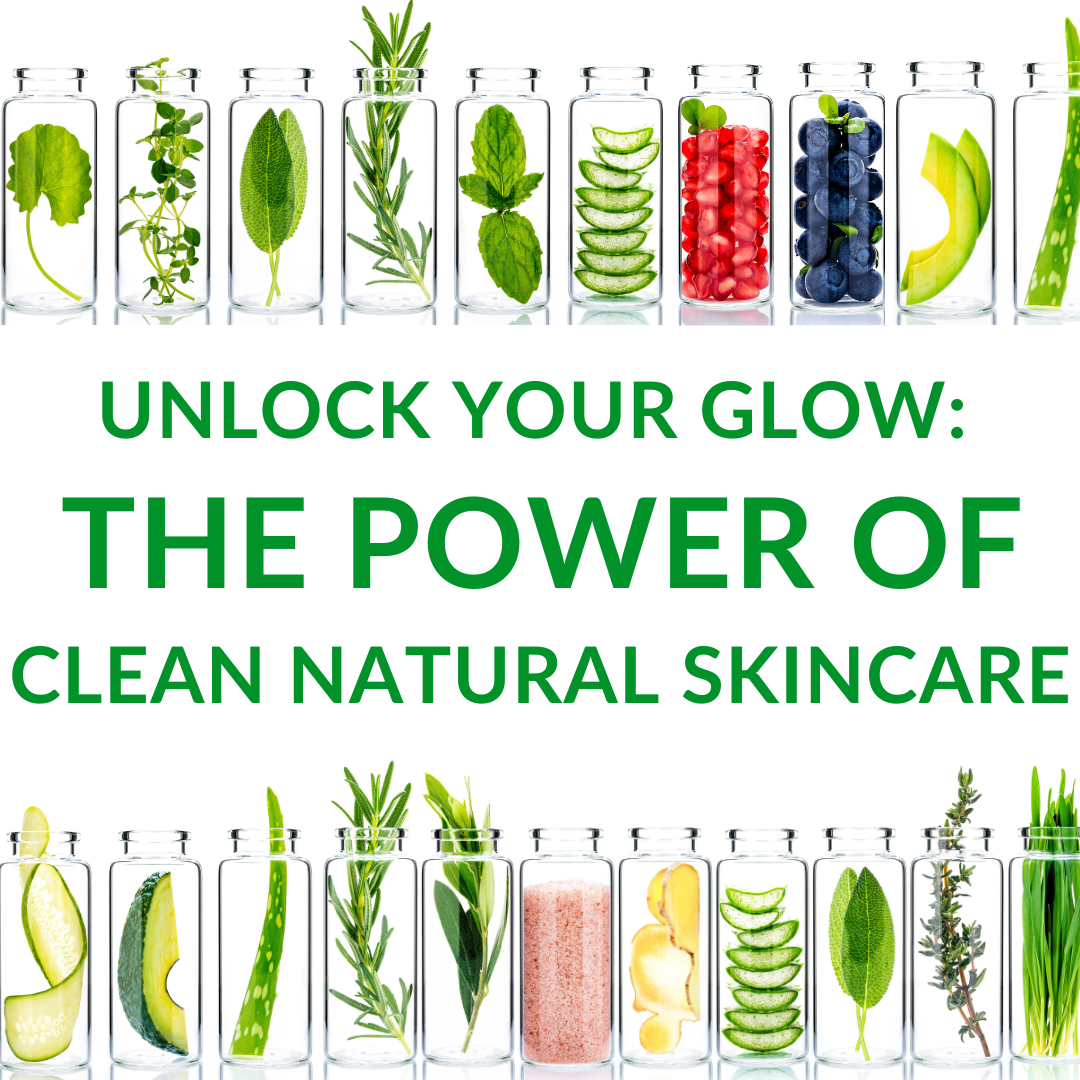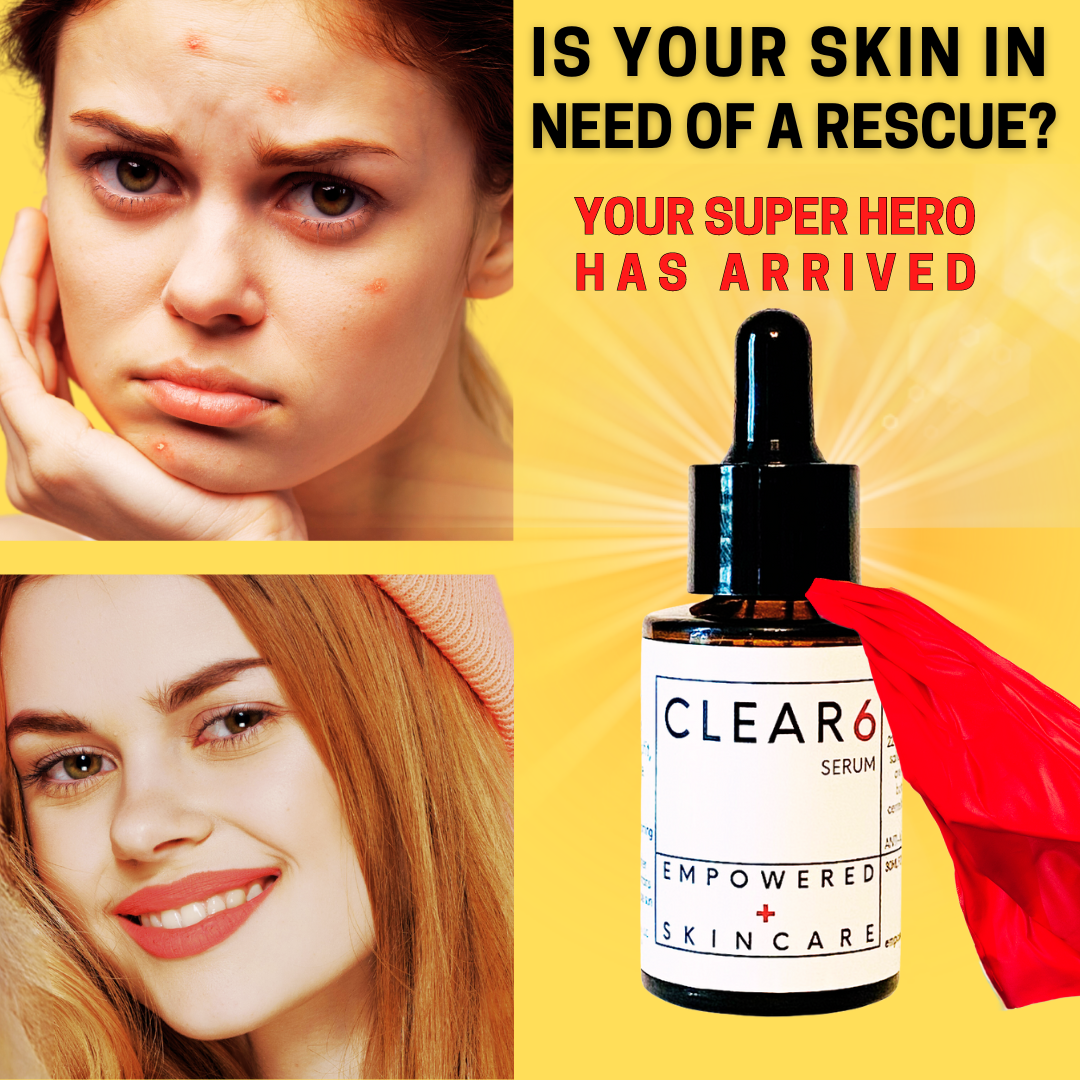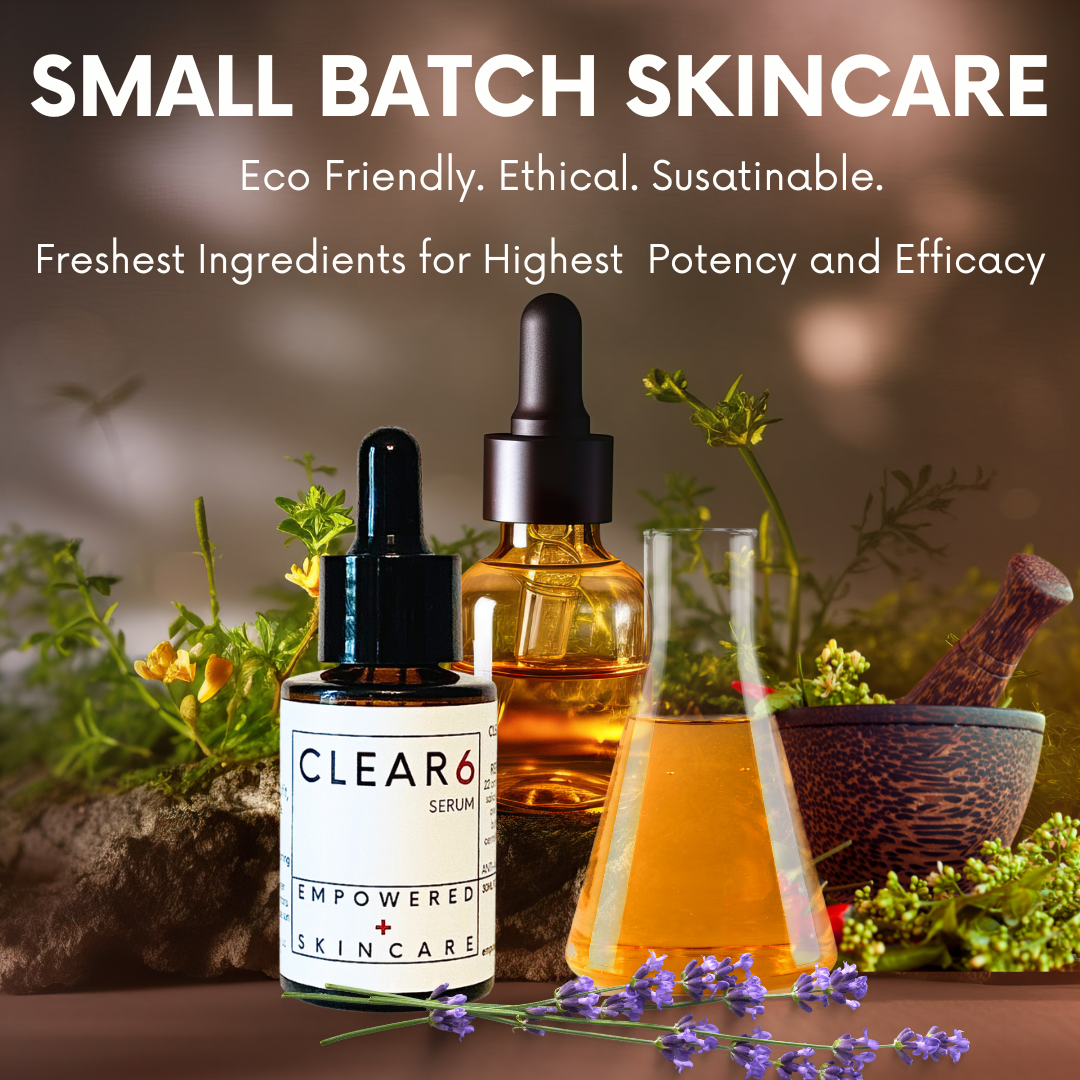
Unlock the Secret: The Transformative Power of Natural Ingredients in your Skincare Routine
Clean Beauty and Clean Skincare is of the utmost importance now a days. Natural skincare solutions prioritize both efficacy and gentleness, for our skin and the environment. At the forefront of this movement stands Empowered Skincare's Clear 6 Serum, a beacon of glycerin-free, multitasking skincare innovation. This product embodies a philosophy rooted in harnessing the power of natural ingredients to combat acne, aging signs, and inflammation effectively.
Here is a list of the most common toxins in skincare today:
1. Parabens: Hormone Disruptors Hiding in Plain Sight
One of the most common yet harmful chemicals found in skincare is parabens. These preservatives are used to prevent mold, bacteria, and yeast growth in beauty products. They are typically listed as methylparaben, propylparaben, butylparaben, or ethylparaben on ingredient labels.
Why Are Parabens Harmful?
Parabens are known to mimic estrogen, a hormone in the body. This endocrine disruption can lead to an imbalance of hormones, increasing the risk of certain cancers, particularly breast cancer. A study published in the Journal of Applied Toxicology found traces of parabens in breast cancer tumors, raising concerns about their cumulative effect on health.
Safer Alternatives to Parabens:
- Phenoxyethanol: A less toxic preservative.
- Sodium Benzoate: A naturally occurring preservative derived from fruits.
2. Phthalates: Plasticizers with Hidden Health Risks
Phthalates are chemical compounds used to make products more pliable. In skincare, they help lotions penetrate the skin and fragrances last longer. You might see them labeled as DBP (dibutyl phthalate), DEP (diethyl phthalate), or DEHP (di(2-ethylhexyl) phthalate).
Why Are Phthalates Harmful?
Phthalates are notorious for their ability to disrupt the endocrine system and have been linked to developmental, reproductive, and hormonal issues. Long-term exposure can lead to fertility problems in both men and women. Additionally, studies have connected phthalates to an increased risk of asthma, allergies, and obesity.
Safer Alternatives to Phthalates:
- Choose phthalate-free labels or products that use natural essential oils for fragrance.
3. Sodium Lauryl Sulfate (SLS) and Sodium Laureth Sulfate (SLES):
Skin Irritants in Your Cleanser
Sodium Lauryl Sulfate (SLS) and Sodium Laureth Sulfate (SLES) are harsh detergents commonly found in cleansers, shampoos, and body washes. They create that luxurious foaming action that many people associate with "clean."
Why Are SLS and SLES Harmful?
These sulfates are well-known skin irritants. They strip the skin of its natural oils, leaving it dry and prone to irritation, especially for sensitive skin. Prolonged exposure can lead to conditions like eczema and dermatitis. Moreover, SLES is often contaminated with 1,4-dioxane, a carcinogen that is not listed on ingredient labels, making it even more harmful.
Safer Alternatives to Sulfates:
- Look for products containing coco-glucoside or decyl-glucoside, which are gentle, plant-derived surfactants.
4. Formaldehyde and Formaldehyde-Releasing Preservatives: Carcinogens in Disguise
Formaldehyde is a preservative often used in cosmetics, despite its classification as a carcinogen by the International Agency for Research on Cancer (IARC). While formaldehyde itself may not always be listed, there are preservatives like quaternium-15, DMDM hydantoin, imidazolidinyl urea, and diazolidinyl urea that slowly release formaldehyde over time.
Why Is Formaldehyde Harmful?
Exposure to formaldehyde can cause skin irritation, allergic reactions, and respiratory issues. Long-term exposure has been linked to an increased risk of certain cancers, particularly in the nasal and respiratory tract.
Safer Alternatives to Formaldehyde-Releasing Preservatives:
- Opt for phenoxyethanol or potassium sorbate, which are safer preservatives.
5. Fragrance: The Mysterious and Dangerous Chemical Cocktail
Fragrance or parfum may sound innocent, but these terms often hide a mix of hundreds of synthetic chemicals, many of which are harmful. Companies are not required to disclose the specific chemicals in their fragrance mixtures, making it difficult for consumers to know what they are being exposed to.
Why Is Fragrance Harmful?
Fragrance mixtures can contain phthalates, allergens, and even neurotoxins. Some chemicals in fragrances are linked to hormonal disruptions, respiratory issues, and allergic reactions. In extreme cases, fragrances can trigger migraines and asthma attacks.
Safer Alternatives to Synthetic Fragrance:
- Look for products labeled fragrance-free or those that use natural essential oils.
6. Mineral Oil and Petrolatum: Pore-Clogging Petroleum Byproducts
Mineral oil and petrolatum are byproducts of petroleum processing and are used in skincare products as moisturizing agents. You’ll often see these in lotions, creams, and balms.
Why Are Mineral Oil and Petrolatum Harmful?
These ingredients are known to create an occlusive layer on the skin, which can trap bacteria, dirt, and other impurities, leading to clogged pores and acne. Additionally, mineral oil is sometimes contaminated with polycyclic aromatic hydrocarbons (PAHs), which are linked to cancer.
Safer Alternatives to Mineral Oil and Petrolatum:
- Opt for plant-based oils like jojoba oil, rosehip oil, or shea butter, which are non-comedogenic and safer for the skin.
7. Hydroquinone: The Dangerous Skin Lightener
Hydroquinone is a popular skin-lightening agent used in products that claim to reduce hyperpigmentation, dark spots, or melasma.
Why Is Hydroquinone Harmful?
Hydroquinone is banned in many countries due to its potential to cause serious health issues, including cancer and organ toxicity. It can also cause ochronosis, a condition that leads to darkening and thickening of the skin. Overuse can result in permanent damage.
Safer Alternatives to Hydroquinone:
- Consider natural skin brighteners like vitamin C, licorice root extract, or kojic acid for a safer way to achieve an even skin tone.
8. Triclosan: The Antibacterial Agent with Alarming Effects
Triclosan is an antibacterial agent found in soaps, cleansers, and toothpaste. While it was once widely used, concerns about its health effects have led to its removal from many products, but it can still be found in some formulations.
Why Is Triclosan Harmful?
Triclosan has been linked to hormone disruption, particularly affecting thyroid function. It can also contribute to the development of antibiotic-resistant bacteria, making it harmful on a larger scale. Environmental studies have shown that triclosan negatively impacts aquatic ecosystems when washed down the drain.
Safer Alternatives to Triclosan:
- Use natural antibacterial ingredients like tea tree oil or aloe vera.
9. Oxybenzone: The Controversial Sunscreen Ingredient
Oxybenzone is a common chemical used in sunscreens to absorb UV rays. However, it has been the subject of controversy for both health and environmental reasons.
Why Is Oxybenzone Harmful?
Oxybenzone is a known endocrine disruptor that can interfere with hormone levels, particularly in children and pregnant women. It has been linked to reproductive issues and developmental problems. Additionally, it is harmful to coral reefs and aquatic life, leading to bans in some regions.
Safer Alternatives to Oxybenzone:
- Choose mineral-based sunscreens containing zinc oxide or titanium dioxide, which are safer for both humans and the environment.
Why Choose Natural Skincare?
In the realm of skincare, the abundance of choices can be overwhelming. Amidst this landscape, the rise of natural skincare has garnered significant attention. But what exactly makes natural skincare so important and beneficial?
1. Avoid Harmful Chemicals
Natural skincare products steer clear of harsh chemicals, artificial fragrances, and synthetic additives that can potentially harm the skin. These chemicals often contribute to skin irritation, redness, and long-term damage, prompting a shift towards safer alternatives.
Toxins in Skincare Products
Toxins found in conventional skincare products encompass a range of harmful chemicals such as parabens, phthalates, and formaldehyde. These substances have been linked to serious health concerns, including disruptions to hormonal balance, allergic reactions, and even carcinogenic risks.
The Absorption Process
The skin, being the body's largest organ, absorbs substances applied to it, facilitating the penetration of these toxins into the bloodstream. Once in circulation, these chemicals can disseminate throughout the body, underscoring the importance of choosing skincare products devoid of harmful additives.
Importance of Avoiding Toxins
Opting for toxin-free skincare products is pivotal in safeguarding overall health. By opting for natural and organic alternatives, individuals can mitigate exposure to hazardous substances, prioritizing both skin health and overall well-being.
How to Safeguard Against Toxins
To shield oneself from skincare toxins, vigilant scrutiny of ingredient labels is essential. Seek products free from parabens, phthalates, and similar chemicals. Additionally, opting for certified organic or natural skincare options ensures safety and efficacy.
2. Gentle on the Environment
Beyond personal health benefits, natural skincare aligns with environmental stewardship. Conventional skincare products often contain ingredients that pose environmental threats. Embracing natural alternatives extends care to the planet, fostering sustainability.
3. Nourishing Ingredients
Natural skincare formulations abound with nourishing components such as plant extracts, essential oils, and vitamins. These elements provide the skin with vital nutrients, fostering health and radiance through gentle, botanical means.
4. Ideal for Sensitive Skin
Individuals with sensitive skin stand to gain immensely from natural skincare's gentle formulations. These products are less likely to trigger adverse reactions, offering a safe haven for sensitive skin types seeking effective skincare solutions.
5. Anti-Aging Advantages
Natural skincare products are replete with antioxidants and anti-aging compounds that combat visible signs of aging. Regular use can help maintain a youthful complexion, addressing fine lines, wrinkles, and uneven skin tone effectively.
Embracing Natural Skincare: A Holistic Approach
In summary, the shift towards natural skincare signifies a commitment to safer, more sustainable skincare practices. By choosing products like Empowered Skincare's Clear 6 serum, consumers not only enhance their skin's health and appearance but also contribute positively to environmental conservation. Embracing natural skincare is more than a trend; it's a conscientious choice that promotes personal well-being and planetary health alike.
In the heart of Clear 6 lies a blend of nature's finest, each ingredient handpicked for its proven benefits. Centella Asiatica, a revered healer, calms inflammation and accelerates the recovery of acne scars, offering a soothing embrace to troubled skin. Bakuchiol steps in with its retinol-like prowess, minus the irritation, granting the skin the gift of youthfulness without the usual side effects.
Navigating further into its composition, we encounter Hypochlorous Acid, a gentle warrior against bacteria, standing guard against breakouts while soothing the skin's every distress signal. Niacinamide, with its multifaceted role, brightens, smooths, and revitalizes, crafting a canvas of clarity and evenness. The journey doesn’t end here; Salicylic Acid, a trusted exfoliant, ensures that clogged pores and acne make way for clear, breathable skin.
Choosing Clear 6 is more than a skincare decision; it's a statement of support for clean beauty, small businesses, and the power of natural ingredients. As a proud woman-owned business, Empowered Skincare brings to you a small-batch miracle, Clear 6, where every drop is a testament to our commitment to quality, efficacy, and environmental stewardship.
Dive into a skincare experience that's empowered by nature with Clear 6 Serum. Discover how our serum can transform your skin and elevate your beauty. Join us in embracing the clean beauty revolution, one drop at a time.




Leave a comment
This site is protected by hCaptcha and the hCaptcha Privacy Policy and Terms of Service apply.